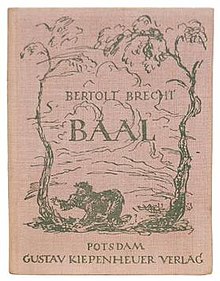Baal (play)
| Baal | |
|---|---|

First published edition
|
|
| Written by | Bertolt Brecht |
| Date premiered | 8 December 1923 |
| Place premiered | Leipzig |
| Original language | German |
Baal was the first full-length play written by the German modernist playwright Bertolt Brecht. It concerns a wastrel youth who becomes involved in several sexual affairs and at least one murder. It was written in 1918, when Brecht was a 20-year-old student at Munich University, in response to the expressionist drama The Loner (Der Einsame) by the soon-to-become-Nazi dramatist Hanns Johst.
The play is written in a form of heightened prose and includes four songs and an introductory choral hymn ("Hymn of Baal the Great"), set to melodies composed by Brecht himself. Brecht wrote it prior to developing the dramaturgical techniques of epic theatre that characterize his later work, although he did re-work the play in 1926.
The story charts the decline of a drunken and dissolute poet, Baal. Baal is an anti-hero who rejects the conventions and trappings of bourgeois society. This situation draws on the German Sturm und Drang tradition, which celebrates the cult of the genius living outside the conventions of society that would later destroy him. "The outcast, the disillusioned tough becomes the hero; he may be criminal, he may be semi-human," argues John Willett, "but in plays like Baal he can be romanticized into an inverted idealist, blindly striking out at the society in which he lives." Baal roams the countryside, womanizing and brawling. He seduces Johanna, who subsequently drowns herself. He spurns his pregnant mistress Sophie and abandons her. He murders his friend Ekart, becoming a fugitive from the police. Defiantly aloof from the consequences of his actions, Baal is nonetheless brought low by his debauchery, dying alone in a forest hut, hunted and deserted, and leaving in his wake the corpses of deflowered maidens and murdered friends.
...
Wikipedia
